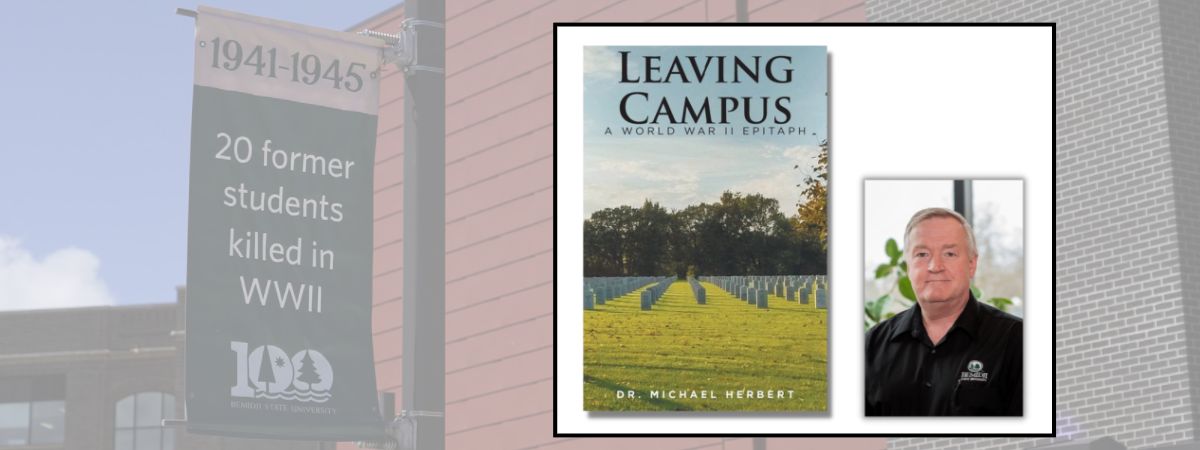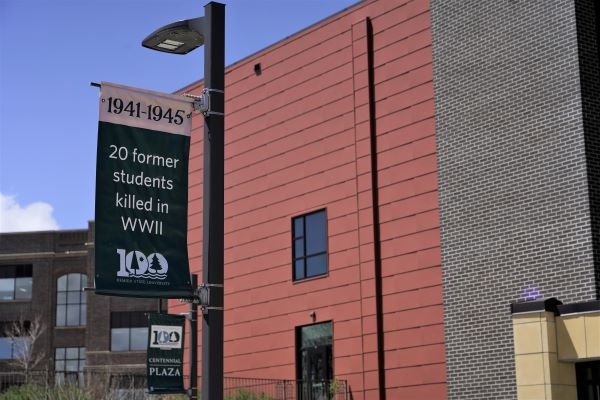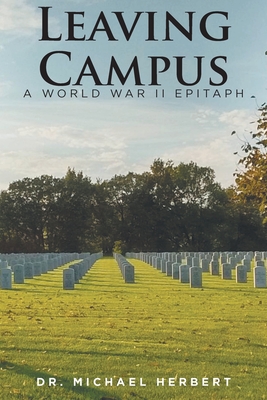
Leaving Campus: A World War II Epitaph, written by BSU grad and current BSU Department of Criminal Justice professor Dr. Michael Herbert ’79, ’92, tells the stories of 20 former Bemidji State Teachers College students who served during World War II and later lost their lives in service to their country.
We sat down with Herbert to talk about the book, his writing process and why he thinks telling their stories is important.
His book can be purchased online here or at Barnes and Noble.
Click here to listen to a 91.7KAXE/90.5 KBXE radio interview with Herbert from April 18, 2022.
What is Leaving Campus about?
The book is two-fold. It focuses on what student life was like during WWII at what was then Bemidji State Teachers College. It also talks about the students who volunteered for military service during the war who were later killed in action.
Readers who have an interest in the school during that period of time or are military history buffs would appreciate the book.
What inspired you to write this?
In 2019 I saw the commemorative banner in Centennial Plaza on campus [referencing the 20 former students killed in action during WWII], and I knew someone needed to tell that story. It took me a little over two years to research and write the book while teaching full-time at BSU – writing mostly on weekends and evenings and in my spare time. The book was released in late January 2022.

What was your research process like? How did you find all this information, and what resources did you find most valuable?
The BSU Records Office was a big help. I would ask them “can you find files on these people?” and many times – but not always – they could find the information in the old paper records from the time.
The folks at the [A.C. Clark] Library were awesome and the university archives were a great resource. I went through their collection of newspapers from the time – the student newspaper, the Bemidji Daily Pioneer and the Bemidji Sentinel – to find articles with mention of these former students. The National Archives and ancestry websites were also very helpful in finding information. The records office and library saw the value of the book and were always willing to help, on top of their day-to-day jobs.
Unfortunately, I was only able to contact a couple families who had any recollection of those in the book. I was sadly disappointed at the number of families who knew very little of their family’s history, or those families that were simply gone altogether. Many of the memories, photos and other records have been lost to time. That fact made it even more important to me to get this information together as fast as I could, because if we don’t it’s going to be gone soon and there won’t be any record of these former students' lives.
Were there any unexpected challenges in the course of writing the book?
I’d never written a book before, so the learning curve was pretty steep as far as how to put the story together in a way that people would think was interesting and want to read, as opposed to the empirical writing I was most familiar with in my academic career.
What sort of response have you received from readers?
Since it is sort of a niche topic, most of my readers have an interest in Bemidji State or military history, but I’ve gotten good responses. I love to hear feedback from people who say “I didn’t know that…” about life on campus at the time. I’m glad all the research I did is interesting to those readers.
Do you have any plans to continue writing?
I’m writing a second book on the women of Bemidji, not just Bemidji State, who volunteered for military service or otherwise supported the war effort during WWII. It will have the stories of Bemidji women who served in the military, joined a vastly male-dominated workforce or supported a family while the men in their lives served overseas.
Any final thoughts about Leaving Campus, its legacy and how it might impact readers?
I’m glad I wrote it because people need to be able to find this kind of information in an accessible way. I also hope it helps people realize the sacrifices our military men and women make; these former students were deferred from service because they were in school, but their sense of duty called them to serve anyway and ultimately they didn’t make it back.
Where can people purchase Leaving Campus?
Hard cover and paper back versions can be purchased on Amazon.com and through Barnes and Noble. An e-book version will be available soon.
About Dr. Michael Herbert
Dr. Michael Herbert earned two degrees from Bemidji State University, a Bachelor of Science degree in Criminal Justice in 1979 and a Master of Arts in Applied Behavioral Science in 1992. After graduating in 1979 he served in law enforcement for 23 years. After graduating with his master’s degree he started teaching as an adjunct professor at BSU in the fall of 1992. In 2004 he retired from law enforcement and took a full-time teaching position with the criminal justice department, earning his doctorate from the University of North Dakota in 2006. Fall 2022 marks his 30th year teaching at BSU.


